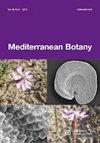Essential oil analysis of eight 'Nepeta' taxa in Iran
IF 0.7
4区 生物学
Q3 PLANT SCIENCES
引用次数: 8
Abstract
Nepeta is one of the largest and important genera of Lamiaceae that is found in many parts of the world as wild plants. These aromatic plants produce essential oil for various pharmaceutical and industrial products. The essential oil composition in eight taxa of Nepeta was analyzed. One natural population from each taxon was selected, and their essential oils extracted using Clevenger apparatus. Moreover, GC and GC/MS analysis methods allowed to reveal the variability in essential oil composition and profile among the studied taxa. The oxygenated monoterpenes were dominant in the oils of N. meyeri, N. mirzayanii, N. racemosa, N. binaludensis, and N. glomerulosa. Phytol was the major compound in the essential oil of N. kotschyi var. persica and N. saccharata (11.56% and 27.04%, respectively). 4aα,7α,7aβ-nepetalactone (73.89%) and 4aα,7β,7aα-nepetalactone (83.92%) were the major constituents in essential oil of N. mirzayanii and N. meyeri, respectively. 1,8-cineol was the principal constituent in the oil of N. glomerulosa var. carmanica, N. binaludensis, N. pogonosperma and N. racemosa (23.34%, 43.49%, 53.94% and 70.89%, respectively). The studied taxa were classified into four distinct groups according to the UPGMA tree with high level of bootstrapping support. Each group was characterized by special trait(s) that could be used for identification of them. Therefore, four chemotypes were separated among the studied taxa: 1,8-cineol, 4aα,7α,7aβ-nepetalactone, 4aα,7β,7aα-nepetalactone, and carvacrol. It was also noticed that the composition of essential oil was highly varied compared to previous results.伊朗八个‘Nepeta’分类群的精油分析
Nepeta是Lamiaceae中最大和重要的属之一,在世界许多地方都是野生植物。这些芳香植物生产用于各种医药和工业产品的精油。对八个尼泊尔属植物的精油成分进行了分析。从每个分类单元中选择一个自然种群,并使用Clevenger仪器提取其精油。此外,GC和GC/MS分析方法可以揭示所研究分类群中精油成分和图谱的变异性。含氧单萜烯在N.meyeri、N.mirzayanii、N.raceosa、N.binaludensis和N.glomelosa的油中占主导地位。植物醇是波斯N.kotschyi变种和糖精N.saccharta精油中的主要成分(分别占11.56%和27.04%)。4aα,7α,7aβ-nepetalactone(73.89%)和4aα,7β,7aα-nepetaractone(83.92%)分别为米叶猪油和美叶猪油的主要成分。1,8-桉叶醇是N.globelosa var.camanica、N.binaludensis、N.pogonsperma和N.raceosa油中的主要成分(分别为23.34%、43.49%、53.94%和70.89%)。根据具有高水平自举支持的UPGMA树,所研究的分类群被分为四个不同的组。每组都有可用于识别它们的特殊特征。因此,在所研究的分类群中分离出四种化学型:1,8-cineol、4aα、7α、7aβ-尼泊尔内酯、4aα,7β、7aα-尼泊尔内酯和香芹酚。还注意到,与以前的结果相比,精油的成分变化很大。
本文章由计算机程序翻译,如有差异,请以英文原文为准。
求助全文
约1分钟内获得全文
求助全文
来源期刊

Mediterranean Botany
Agricultural and Biological Sciences-Plant Science
CiteScore
2.40
自引率
10.00%
发文量
30
审稿时长
12 weeks
期刊介绍:
Mediterranean Botany (ISSNe 2603-9109), formerly Lazaroa, is a biannual journal that publishes original research studies in the field of Botany including plant systematics, vegetation ecology, biogeography, evolutionary biology, ecophysiology, community ecology, ethnobotany and conservation biology on Mediterranean biomes but also in interacting areas.
Mediterranean Botany is an OPEN ACCESS Journal, free of charges for any published article.
 求助内容:
求助内容: 应助结果提醒方式:
应助结果提醒方式:


